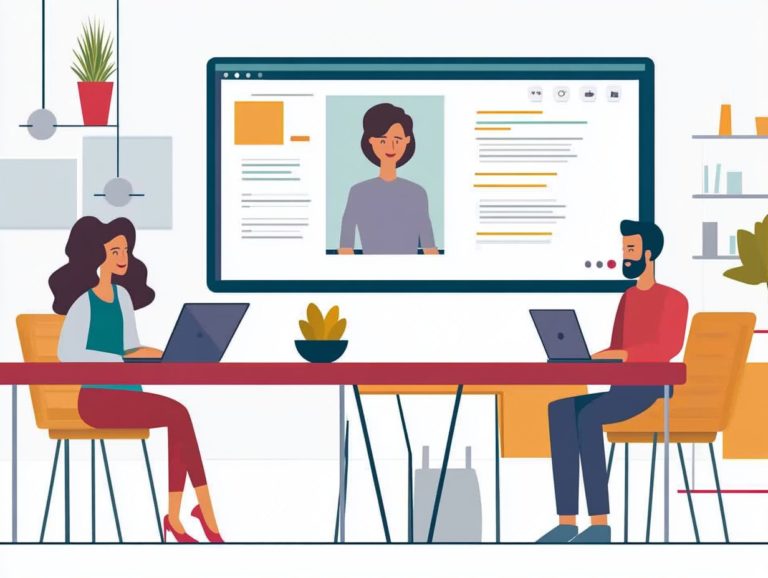The Future of E-Learning in Corporate Training
In today s rapidly evolving business landscape, corporate training is experiencing a significant transformation. Traditional methods are being reshaped by the emergence of e-learning, which provides tailored solutions to meet the diverse needs of modern employees.
This article delves into the evolution of corporate training, showcasing the myriad benefits of e-learning such as cost savings, enhanced time efficiency, and personalized learning experiences.
You ll also discover common challenges that arise along the way, along with effective solutions. You’ll also see what future e-learning technologies are on the horizon!
Contents
- Key Takeaways:
- The Evolution of Corporate Training
- Benefits of E-Learning for Corporate Training
- Overcoming Challenges in E-Learning Implementation
- The Future of E-Learning in Corporate Training
- Frequently Asked Questions
- What is the current state of e-learning in corporate training?
- How does e-learning benefit corporate training?
- What can we expect for the future of E-Learning in corporate training?
- Will E-Learning eventually replace traditional forms of corporate training?
- How can companies ensure the success of their E-Learning programs for corporate training?
- What are some potential challenges for the future of E-Learning in corporate training?
Key Takeaways:

- E-learning is a cost-effective and efficient method for corporate training, saving companies time and money. It also offers personalized learning and flexibility for employees.
- The implementation of e-learning may face technological barriers and challenges with engagement and motivation, but these can be overcome with proper planning and support.
- The future of e-learning in corporate training is incredibly exciting, with emerging technologies and trends shaping employee development and performance for the better.
The Evolution of Corporate Training
The evolution of corporate training has undergone a remarkable transformation, moving away from traditional methods to embrace modern e-learning solutions. This shift, propelled by new technology and the demand for scalable, cost-effective training programs, is designed to enhance both employee performance and satisfaction, reflecting the latest trends in corporate training.
Leading companies such as IBM, Deloitte, and Amazon have taken the initiative, adopting remote training methods to keep pace with the dynamic business landscape and the evolving needs of their workforce. This transition seeks to cultivate a more engaging and personalized learning journey, fostering continuous skill development and professional growth.
Traditional Training Methods
Traditional training methods often confine you to in-person classroom sessions, workshops, and static materials, which can significantly limit your flexibility and engagement as you seek to develop new skills in today s fast-paced corporate environment.
While these conventional approaches offer structure, they often fail to accommodate the diverse learning styles and schedules that define a modern workforce. You might find yourself grappling with scheduling conflicts that prevent you from attending important sessions, leading to frustration and missed chances for skill enhancement.
Many workshops adopt a one-size-fits-all attitude, leaving you feeling disengaged because they don t allow you to tailor your learning experiences to meet your specific needs or interests. Ultimately, these traditional methods may fall short of delivering the dynamic, personalized training solutions that you increasingly require in today s rapidly evolving job market.
The Rise of E-Learning
The rise of e-learning has transformed corporate training, offering you flexible learning solutions tailored to your individual needs. This approach includes blended learning in corporate training, allowing you to engage with interactive content and complete training programs at your own pace, significantly enhancing your knowledge retention.
This modern approach not only accommodates diverse learning styles but also reduces the time you spend away from work a common drawback of traditional training methods. As organizations increasingly embrace these digital platforms, they are witnessing remarkable improvements in employee performance and engagement.
For instance, gamified modules, which use game-like elements to enhance learning, and scenario-based learning, which puts you in real-world situations, immerse you in real challenges, fostering a deeper understanding of your role.
Adaptive learning paths cater to your unique skill levels, ensuring you receive the support you need. This ultimately drives productivity and satisfaction within the workforce, creating an environment where everyone can thrive.
Benefits of E-Learning for Corporate Training
E-learning offers many advantages for corporate training. It provides cost-effective solutions that lower overall training expenses. It also delivers personalized learning experiences tailored to the diverse needs of your employees.
This approach not only enhances training effectiveness but also boosts employee satisfaction. It s a strategic investment in your workforce’s development.
Cost Savings and Time Efficiency

One of the most compelling benefits of e-learning is its ability to save both time and money. It enables you to cut training costs by minimizing reliance on physical resources. Employees can learn at their convenience.
By leveraging online platforms, you can significantly reduce expenses related to traditional training methods, such as travel, venue rental, and printed materials. A study by the Brandon Hall Group highlights that businesses leveraging e-learning can enjoy a 24% higher employee retention rate.
Organizations like IBM have reported annual savings of approximately $200 million due to enhanced training efficiencies. Your employees are no longer tethered to a rigid schedule; they can interact with learning materials whenever it fits into their day, ultimately boosting productivity.
In fact, the average e-learning course can be completed 40-60% faster than its traditional classroom counterpart. This facilitates quicker skill acquisition and immediate application in real-world situations.
Personalized Learning and Flexibility
E-learning offers personalized learning experiences that allow you to tailor training programs to fit your unique learning paths and schedules. This fosters a culture of continuous learning and skill development within your organization.
This adaptability keeps you engaged and cultivates a sense of ownership over your personal and professional growth. By leveraging smart learning tools that adjust to your needs, your organization can provide content that aligns perfectly with your strengths and areas for improvement.
These systems analyze your interactions and progress, delivering relevant resources and support exactly when you need them. As a result, this targeted approach makes you feel valued, as your specific needs are recognized and addressed.
Ultimately, this leads to increased job satisfaction and sustained motivation in your role.
Overcoming Challenges in E-Learning Implementation
When implementing e-learning in corporate training, you may encounter challenges like technological barriers and the need to maintain high engagement levels. Address these issues promptly to ensure smooth integration.
This highlights the importance of adopting effective training strategies and conducting regular evaluations to measure success and tackle any emerging problems.
Technological Barriers
Technological barriers can significantly impact the effectiveness of your e-learning programs. They create challenges related to learning management systems, the integration of AI technology, and the adoption of virtual reality for immersive learning experiences.
Don t let platform compatibility issues hold you back address them now! You may encounter hurdles that restrict access to essential tools and content for your learners.
It s vital to ensure that adequate resources like high-speed internet and modern devices are available for a successful transition to e-learning. To tackle these issues, consider investing in robust learning management systems that provide flexible compatibility with various platforms.
Additionally, exploring emerging technologies, such as AI-driven analytics and virtual reality for simulations, can foster a more engaging and effective learning environment. This ultimately enhances the overall educational experience for everyone involved.
Engagement and Motivation
Maintaining high engagement levels and motivation among employees in e-learning environments is essential. By implementing strategies like gamification (adding game-like elements to training to make it more engaging) and interactive content, you can significantly enhance the learning experience and encourage peer-to-peer learning.
Incorporating elements such as points, badges, and leaderboards can effectively ignite a sense of competition and achievement within your team. Collaboration tools like discussion forums and group projects promote interactive participation, allowing learners to share insights and support each other on their educational journeys.
These approaches not only make the learning process more enjoyable but also empower individuals to take ownership of their development. Embracing these innovative methods can lead to higher retention rates and a more fulfilled workforce, ready to take on new challenges with enthusiasm.
The Future of E-Learning in Corporate Training

The future of e-learning in corporate training is set for transformation, driven by emerging technologies and trends. Expect the integration of AI and VR technology to revolutionize the learning experience, significantly enhancing training effectiveness and fostering employee development, as highlighted in the impact of video learning in corporate training.
Embracing these innovations will not only elevate the quality of training but also empower your team to thrive in an ever-evolving landscape.
Emerging Technologies and Trends
Emerging technologies such as AI, VR, and gamification are important to the evolution of e-learning. They offer innovative solutions that enhance your engagement and create adaptive learning environments tailored to your needs.
As you recognize the significance of continuous skill development, these technologies become critical tools in your corporate training arsenal. For instance, gamification infuses training modules with game-like elements, allowing you to tackle challenges that elevate motivation and retention.
Adaptive learning takes it a step further by utilizing algorithms to analyze your performance and adjust content delivery. This ensures that you receive personalized training that aligns perfectly with your learning pace and style.
Companies that embrace these methods witness improved knowledge retention and enjoy higher employee satisfaction and productivity, ultimately cultivating a more competent workforce.
Impact on Employee Development and Performance
The impact of e-learning on employee development and performance is profound. It creates a culture of continuous learning and knowledge sharing, enhancing training effectiveness and aligning your team’s skills with organizational goals.
This innovative approach enables your organization to remain agile in a rapidly changing business landscape, where technological advancements and shifting market demands necessitate a workforce that is both adaptable and skilled. By providing employees easy access to a wealth of resources and specialized training modules, you empower them to take ownership of their professional growth.
E-learning fosters collaborative learning experiences, encouraging your team to share insights and best practices. This shared knowledge enhances collective intelligence and boosts overall performance. As a result, companies prioritizing e-learning cultivate a more competent workforce and gain a significant competitive edge in the market.
Frequently Asked Questions
What is the current state of e-learning in corporate training?
The use of e-learning in corporate training has been steadily increasing over the years, with more companies implementing it as a key component of their training programs, especially with the help of the top 10 e-learning platforms for corporate training.
How does e-learning benefit corporate training?

E-learning provides a more efficient and cost-effective way for companies to train their employees. It eliminates the need for travel, materials, and instructors.
What can we expect for the future of E-Learning in corporate training?
The future of E-Learning in corporate training looks promising, especially when considering what is the future of corporate training. Technology is making learning experiences more engaging and tailored to individual needs.
Will E-Learning eventually replace traditional forms of corporate training?
E-Learning is gaining traction but won t completely replace traditional training methods. It will complement other approaches to create a comprehensive program.
How can companies ensure the success of their E-Learning programs for corporate training?
Companies can boost the success of E-Learning by choosing a user-friendly platform. Providing support and regularly updating content are also crucial.
What are some potential challenges for the future of E-Learning in corporate training?
Challenges for E-Learning include keeping technology updated and ensuring it is accessible for everyone. There s also a risk that employees may feel overwhelmed or disengaged.






